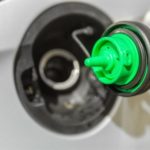Quick Navigation
Is there a change in the sound made by your car when you press on the gas?
You can quickly notice such a change if you have been using the car for a long time or driven it for a long distance.

Many things can make your car produce a loud noise when you press on the gas. The following are the primary reasons behind this noise.
1. Problem With The Belt
The belt is a vital component that ensures movement within the engine.
Therefore, it should be the first component you check whenever you hear the loud noise coming from the car when you press on the gas.
Some of the issues that affect the functioning of the belt include failed pulleys and worn belt surfaces. These defects will make the belt not move smoothly, thus creating a loud noise when pressing on the gas.
The belt noise can also be due to loose belts. When the belts are loose, they move slowly or even slip out of the pulleys. It will produce a loud noise and may even make your car stall.
To correct this problem, you have to check the condition of the belts and the pulleys. If they are new, the issue might have to do with loose tensioners, and you will have to tighten them.
2. Faulty Exhaust System
The exhaust system performs two critical functions – directing the exhaust fumes out of the car and regulating the noise made by the engine.
However, since it is located below and outside the car, it is prone to damage. A damaged exhaust system will leak and, in the process, makes a rumbling or hissing noise.
This noise is often more loud and noticeable when you press on gas since the engine will run faster. Also, a damaged exhaust system will fail to regulate the noise, resulting in things getting loud.
You can identify a problem with the exhaust system by thoroughly inspecting each of its components.
The leak can be due to a damaged muffler, loose brackets, faulty gasket, or an issue with other parts of the exhaust system.
But if you cannot spot the problem, you will have to visit a mechanic who will check it for you and fix it appropriately.
3. Worn Valves
The valves are moving components that ensure the optimal performance of the engine. They do so by letting in air and letting out exhaust fumes.
They also let the fuel in. However, over time valves get worn, meaning they will open and close at an abnormal rate.
For instance, they will move faster when you press the gas, making a loud clicking noise.
4. Faulty Engine Bearings
The loud noise when you press on gas can also be due to faulty engine bearings. The bearings in the engine enable the cam and crankshaft to rotate many times.
However, they can wear out after several movements, and when this happens, they start making a screeching sound which is very loud when you press on the gas.
You cannot repair faulty engine bearings; hence, installing a new one is the only way to eradicate the loud noise when you press on the gas.
It might be a tedious process, especially if your car requires removing the engine to install the new bearings; hence you might have to visit a mechanic.

5. Worn Pistons
The loud noise can also be due to worn pistons like in bearings. The pistons make the engine rotate, but when they are worn, they tend to make a loud knocking noise, especially when you press on the gas.
So how do you get rid of the loud noise? You can eliminate it by replacing the worn pistons.
But it would help if you were careful when diagnosing the pistons since even pistons that appear new may have their upper ring lands damaged and will still need to be replaced.
6. Faulty Transmission
The transmission is another part that, when damaged, will make your car produce a loud noise when you press on the gas. Its role is to direct power to the wheels and therefore requires sufficient maintenance.
If the transmission is not maintained well through regular and proper lubrication, its components, such as the gears, will get damaged due to friction and overheating.
The damaged gears will make a whining noise every time you speed up the vehicle.
Top up the lubricating fluid and check if the transmission still makes the noise to fix the problem. If it still does, then some of its components are probably damaged.
You can then go ahead and repair or replace them.
7. Bent Axles
The axles are parts that supply power to the wheels. The wheels will not move when they are bent, but the axles will vibrate and make a loud rumbling noise.
This noise is heard when you press on the gas since the power that reaches the axles will be enormous.
It would be best to correct the loud noise coming from the axles immediately you hear it since an axle is an important part that can make your car stall when bent.
A bent axle can also damage others parts in the vehicles, such as the ball bearings and the joints. It is often impossible to repair it since it must be strong at all times; hence you can only install a new one.
8. Problem With Ball Bearings
The ball bearings help reduce friction between the wheels and the ground, enabling your car to move smoothly. But there are some occasions when the ball bearings fail to do this.
For instance, when the ball bearings have run low in lubrication fluid or are worn out, they tend to make loud rumbling noise, especially when you press on the gas.
It is due to their inability to turn smoothly in their sockets.
Therefore, the significance of the ball bearings should never be underestimated. It would be best if you thus heeded to the noise as soon as you hear it.
The good thing is that they can be repaired, saving you some penny. Also, you don’t have to install similar ball bearings on different wheels whenever you choose to buy new ones.
It enables you to replace the broken ones while leaving the rest intact.
In Summary
A loud noise made by your car when you press on the gas can be infuriating, especially when it makes people look in the direction of your car.
Therefore, it is essential to understand what causes it and whether you can fix it.
This loud noise is usually caused by malfunctioned components such as faulty exhaust systems, worn valves, pistons, issues with the bearings, etc.
These parts are essential in your car, and if they are not repaired or replaced, they might damage other components in the vehicle. It will thus be best if you heed to the noise as soon as possible.

Patrick started his love affair with cars in his childhood. Over the years, he claims a sturdy hold on his driving skills, along with a thorough understanding of cars. We can expect some interesting, holistic, and pleasurable blogs with his flair for writing and his love for cars.
Being a car enthusiast, Patrick has experience comprising of two decades in which he has ridden some of the meanest and strongest machines in the automotive industry. His previous avatars include an automotive professional, photographer, and journalist, and you will certainly experience the roundness of experience in his piece on this site.
In his second decade of reviewing cars and analyzing tools, Patrick is all set to give you convincing, reliable, and the latest information regarding what’s happening in the automotive industry. Currently, he owns a BMW Z3 but cannot get his eyes off Aston Martin DB5. He is a car enthusiast; he loves cooking and listening to music, especially jazz. Here are some of the pieces written by our ace author.

![Gas Gauge Goes Up And Down [Causes + Solutions] Gas Gauge Goes Up And Down [Causes + Solutions]](https://carsupercare.com/wp-content/uploads/2022/04/Gas-gauge-goes-up-and-down-Causes-and-Solutions.docx-150x150.jpg)




